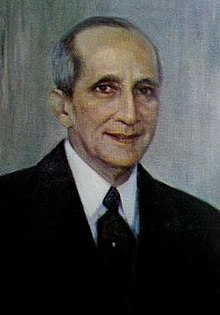Andrés Eloy Blanco
This article includes a list of general references, but it lacks sufficient corresponding inline citations. (September 2020) |
Andrés Eloy Blanco | |
|---|---|
 | |
| Minister of Foreign Affairs of Venezuela | |
| In office 15 February 1948 – 24 November 1948 | |
| President | Rómulo Gallegos |
| Preceded by | Gonzalo Barrios |
| Succeeded by | Luis Emilio Gómez Ruiz |
| Personal details | |
| Born | 6 August 1896 Cumaná, Sucre state |
| Died | 21 May 1955 (aged 57) Mexico City, Mexico |
| Political party | Democratic Action |
| Spouse | Lilina Iturbe |
| Profession | writer, poet, politician |
| Signature | |
Andrés Eloy Blanco Meaño (6 August 1896 – 21 May 1955) was a noted Venezuelan poet and politician. He was a member of the Generación del 28, and one of the founders of Acción Democrática (AD). He was Minister of Foreign Affairs of Venezuela from 15 February 1948 until 24 November 1948.[citation needed]
Biography
[edit]He was born in Cumaná, Sucre state, Venezuela, 6 August 1896. Blanco's family settled on Margarita Island, (Nueva Esparta State) where he lived part of his childhood. Until he moved to Caracas to attend classes at Universidad Central de Venezuela.
He earned his first award in 1918 by writing the pastoral poem Canto a la Espiga y al Arado, and released his first drama play, El Huerto de la Epopeya. That year he was put in jail by protesting against the government. In 1923 got his first prize at the Juegos Florales (Floral Games) in Santander, Cantabria, Spain with the poem Canto a España (A Song to Spain). He traveled to Spain to receive the reward and stayed there for more than a year.[citation needed]
He was Minister of Foreign Affairs of Venezuela from 15 February 1948 until 24 November 1948.[citation needed]. In 1948 Blanco was exiled to Mexico City and Pedro Infante sings the song "Angelitos Negros" in the homonymous film inspired by his poem Píntame Angelitos Negros[1][2] set to music by the Mexican composer Manuel Álvarez Maciste.[3] It's a protest against racism.
He died in Mexico City, Mexico, 21 May 1955. Several Venezuelan municipalities are named in his honor.
Bibliography
[edit]- Tierras que me oyeron (1921)
- Poda (1934)
- La Aeroplana Clueca (1935)
- Baedeker 2000 (1935)
- Barco de Piedra (1937)
- Abigaíl (1937)
- Malvina recobrada (1938)
- Liberación y Siembra (1938)
- Angelitos Negros (Black Little Angels) (1943)
- El Poeta y el pueblo (1954)
- Giraluna (1955)
- La Juanbimbada (1959)
See also
[edit]References
[edit]- "Andrés Eloy Blanco"
- Andrés Eloy Blanco biography
- Francisco Escamilla-Vera. Andrés Eloy Blanco (1896–1955). Barcelona: Biblio 3W – REVISTA BIBLIOGRÁFICA DE GEOGRAFÍA Y CIENCIAS SOCIALES (Serie documental de Geo Crítica), Universidad de Barcelona. Vol. IX, nº 550, 5 de diciembre de 2004 [1].
- Luis Chesney Lawrence (Universidad Central de Venezuela, Caracas). Venezuelan dramatists in shadows: Andrés Eloy Blanco. In Spanish [2].
External links
[edit]- Andres Eloy Blanco recorded at the Library of Congress for the Hispanic Division's audio literary archive on 23 November 1943.
- 1896 births
- 1955 deaths
- People from Cumaná
- Venezuelan male poets
- Ministers of foreign affairs of Venezuela
- Central University of Venezuela alumni
- Road incident deaths in Mexico
- Democratic Action (Venezuela) politicians
- Presidents of the Venezuelan Chamber of Deputies
- Venezuelan expatriates in Mexico
- Burials at the National Pantheon of Venezuela
- 20th-century Venezuelan poets
- 20th-century Venezuelan male writers
- Political prisoners during the dictatorship of Juan Vicente Gómez
- Generation of 1928
- Members of the Venezuelan Constituent Assembly of 1946
- Rómulo Gallegos ministers
- Public works ministers of Venezuela
- Venezuelan prisoners and detainees
